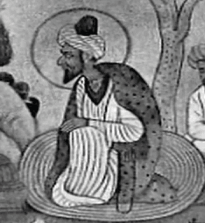Sheikh Ul Alam
Sheikh Ul Alam, a respected poet and spiritual leader, was born into a society that would later experience his significant influence on literature, spirituality, and social consciousness. Buried in obscurity, his life is a motivational story of a modest beginning that grew into an enduring legacy. Sheikh Ul Alam's early years were characterized by simplicity and peace because he was born in a small village tucked away among Kashmir's breathtaking scenery. His birth year is unknown, but historical reports place it in the 14th century. His upbringing was entrenched in the teachings of Islam and the rich cultural legacy of the area because he was raised in a devoted and pious household. The teachings of Sufism and the appeal of Persian poetry mixed with the essence of the ancient Vedic knowledge in Kashmir, a melting pot of many beliefs and traditions. The harmony and inclusion that would characterize Sheikh Ul Alam's later life were fostered in this atmosphere, which was vital in forming the young man's worldview. From a young age, he showed a strong desire for spiritual awakening and a love of poetry. He embarked on a journey of self-discovery and profound wisdom due to his passion for information, which drove him to seek the instruction of illustrious academics and Sufi teachers. This biography dives deeply into the life of Sheikh Ul Alam, examining the character-shaping events that affected him, the timeless lessons he taught, and the legacy he left behind. We learn the profound impact this spiritual giant had not only on the people of Kashmir but also on the larger Sufi tradition and beyond as we move through the chapters of his life. Cultural and User Family InfluencesHis familial and cultural upbringing significantly influenced Sheikh Ul Alam's attitude, beliefs, and spiritual path. His family offered a solid foundation for his spiritual aspirations and academic interests because they were observant Muslims by heritage. A renowned lineage of Kashmiri intellectuals and Sufi practitioners made up Sheikh Ul Alam's family. This spiritual tradition profoundly impacted his childhood, which exposed him to Sufi teachings at a young age. His parents, who were well-known for their dedication and religion, instilled in him the compassion, humility, and service to others characteristics that would eventually define his life. He grew up in Kashmir, a tranquil and culturally diverse environment where diversity and syncretism were highly valued. Sheikh Ul Alam gained a distinctive perspective on religion and life from Kashmir, a region renowned for blending numerous philosophical and theological traditions. His worldview and approach to spirituality were formed by the teachings of Islam, along with the mystic knowledge of Sufism and the philosophical principles of Kashmiri Shaivism. As a young lad, Sheikh Ul Alam was first exposed to Kashmir's rich literary and poetic traditions. The area's well-known lively poetry groups and literary festivals fostered his passion for books and poetry. This cultural setting stoked his desire to communicate spiritual insights through the power of language, inspiring him to become a renowned poet whose lyrics still enthrall and inspire audiences. The thriving Sufi communities in Kashmir also significantly influenced Sheikh Ul Alam's spiritual development. He sought advice from eminent Sufi masters and absorbed their lessons of love, tolerance, and oneness, which were fundamental to Sufi philosophy. He committed himself to the search for inner understanding and heavenly connection as the Sufi path served as his compass. Sheikh Ul Alam was influenced by the writings of older Sufi luminaries and poets in addition to his Sufi instructors. He drew inspiration from their works and incorporated their knowledge into his compositions. His poetry frequently reveals a great yearning for the holy and an intense love for all creation, traits typical of Sufi philosophy. Sheikh Ul Alam's spiritual development took root. It blossomed in this familial and cultural context, finally molding him into a visionary mystic, philosopher, and poet whose influence endured throughout the years. His writings, poetry, and teachings prove the everlasting influence of family, culture, and spirituality in determining the course of a person destined to have a lasting impact on humanity. The Spiritual Journey and AwakeningDeeply moving encounters during Sheikh Ul Alam's spiritual path and awakening helped him become a famous Sufi saint and spiritual guru. He sought thought and attained inner illumination on his way to enlightenment. Sheikh Ul Alam has a strong desire for spiritual understanding and a close relationship with God from a young age. He sought advice from respected Sufi masters and intellectuals in Kashmir due to this inner calling. Under their guidance, he immersed himself in the esoteric knowledge and practices that would later form the basis of his spiritual path, delving into the mystical teachings of Sufism. Sheikh Ul Alam performed strenuous spiritual exercises and ascetic practices as he advanced along his journey to purify his heart and achieve spiritual enlightenment. He committed to remembering God (dhikr) and spent much time reflecting and meditating. Through these techniques, he could transcend the physical realm and establish a close relationship with the divine. 
Sheikh Ul Alam's encounter with a respected Sufi saint, who later served as his spiritual mentor and guide, was one of the turning points in his path. This encounter sparked his spiritual development, and he soon started to have intense mystical states and divine visions. Sheikh Ul Alam developed a greater understanding of the spiritual world's complexities via the direction of his spiritual master. Sheikh Ul Alam's teachings started to place more emphasis on the universal values of love, tolerance, and compassion as his spiritual development progressed. He promoted personal growth and selfless service to others to be closer to God. His lessons appealed to people of all religions and ethnic backgrounds because they cut beyond barriers. Sheikh Ul Alam's lyrical poetry, which served as a medium for sharing profound spiritual truths and insights, also expressed his spiritual journey. People connected with his poetry and admired him as a mystic poet because it was filled with divine love and longing. Sheikh Ul Alam stayed closely connected to Kashmir's natural splendor throughout his life, drawing spiritual inspiration from its imposing vistas and peaceful environs. He frequently sought seclusion and introspection in the mountains and valleys, where he found comfort in thinking about God's creation. Sheikh Ul Alam's reputation as a spiritually enlightened individual developed as he progressed on his spiritual journey, drawing followers and devotees from far and wide. Beyond Kashmir's borders, his teachings and influence left a lasting impression on individuals looking for knowledge and spiritual direction. In conclusion, Sheikh Ul Alam's spiritual awakening and journey served as a testimonial to the effectiveness of sincerely and devotedly seeking divine truth. For countless generations, his profound encounters and teachings will inspire those looking for the truth and shed light on the spiritual path. Seeking Knowledge and GuidanceSheikh Ul Alam's pursuit of knowledge and direction significantly shaped his intellectual growth and spiritual path. Thanks to his voracious curiosity and passion for knowledge, he spent his entire life seeking insight, consulting various sources, and consulting eminent academics and mystics for advice. Sheikh Ul Alam showed a great desire to understand life's mysteries and a natural predisposition toward learning from an early age. His early exposure to Islamic teachings and the Quran established the groundwork for his intellectual development. However, he craved a more profound understanding and wished to delve into the nuanced facets of mysticism, philosophy, and spirituality. 
Sheikh Ul Alam set out on a quest to learn from many sources after realizing the shortcomings of traditional schooling. He traveled extensively, visiting notable academic institutions and conversing with academics from other traditions. His intellectual interests led him to the feet of learned men, where he engaged in conversations on theology, philosophy, and mysticism and picked their brains for nuggets that deepened his grasp of the spiritual. Sheikh Ul Alam's encounter with a respected Sufi master, who understood his earnestness and yearning for heavenly wisdom, was a turning point in his quest for direction. Sheikh Ul Alam studied Sufism's teachings in greater detail under the direction of this spiritual guru, uncovering profound insights that spoke to his inner journey. The master-disciple connection gave him a framework for spiritual development and a way to direct his intellectual efforts toward realizing God. Sheikh Ul Alam approached knowledge with an all-encompassing viewpoint that cut across religious lines. In addition to Islamic sources, he also took inspiration from the knowledge of other traditions, such as Kashmiri Shaivism's native philosophy and Sufism's universal truths. With this eclectic approach, he could better understand and bridge gaps between different belief systems, promoting unity amid variety.
Next TopicShipra Goyal
|
 For Videos Join Our Youtube Channel: Join Now
For Videos Join Our Youtube Channel: Join Now
Feedback
- Send your Feedback to [email protected]
Help Others, Please Share









